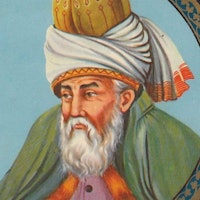My religion is to live through Love… I’ve beat this drum of Love for so long, for you whom I adore, singing: “My life depends upon my dying.”
My religion is to live through Love… I’ve beat this drum of Love for so long, for you whom I adore, singing: “My life depends upon my dying.”
Jalaluddin Mevlana Rumi

To Live Through Love
Topic: Love, Compassion, & Kindness
My religion is
to live through Love:a life created from my own
small mind and self
would be a disgrace.The blade of Love cuts away
what covers the lover’s soul;
Love’s sword severs sins.When the bodily grime is gone,
a shining moon appears:
Spirit’s moon in a wide-open sky.I’ve beat this drum of Love
for so long, for you whom I adore,
singing: “My life depends upon my dying.”This keeps my body and soul alive.
I dream but I do not sleep.This seagull fears no shipwreck.
Her feet love to touch the Ocean.
Jalāl al-Dīn Muḥammad Rūmī (born September 30, 1207, in Balkh, present-day Afghanistan – died December 17, 1273, in Konya, present-day Turkey) is revered as one of the world’s greatest poets, mystics, and spiritual teachers. Known in the West simply as Rumi, he was born into a family of scholars and mystics who fled westward during the Mongol invasions, eventually settling in Konya, then part of the Seljuk Empire. Under the guidance of his father, Bahāʾ al-Dīn Walad, Rumi was trained in Islamic theology, jurisprudence, and the contemplative disciplines of the Sufi path. His early years reflected the classical model of a scholar-saint—rooted in devotion, study, and service to his community.
Rumi’s life was transformed by his meeting with the wandering mystic Shams of Tabriz around 1244. Their profound spiritual companionship awakened in Rumi a passion that transcended formal learning and opened him to the depths of divine love. When Shams mysteriously disappeared, Rumi’s grief became the flame that illuminated his poetry and devotion. From this crucible emerged the Mathnawī, often called the “Persian Qur’an,” a six-volume masterpiece that weaves stories, parables, and reflections into a vision of love as the animating force of all creation. His shorter lyric poems, collected in the Divan-e Shams-e Tabrizi, sing of longing, union, loss, and the ecstatic dance between the soul and the Beloved.
Rumi’s teachings centered on the transforming power of divine love, the unity underlying all faiths, and the inward journey from self-centeredness to God-centeredness. He taught that every experience—joy and sorrow, presence and absence—serves as a mirror reflecting the divine mystery. After his passing, his followers established the Mevlevi Order, known for its sacred whirling as a form of remembrance (dhikr). Across eight centuries, Rumi’s voice has transcended language, culture, and creed, inviting seekers into the stillness of the heart where the human and divine meet in love.
Mathnawi
J. M. Rumi, Mathnawi I (4059-4064), trans., Kabir Helminski & Ahmad Rezwani, in Love's Ripening: Rumi On the Heart's Journey [My Life Is through Dying] (Boston: Shambhala Publications, 2008) Pp. 128-129.

Jalaluddin Mevlana Rumi
Theme: Love

About This Jalaluddin Mevlana Rumi Poem [Commentary]
From The Introduction By Kabir Helminski
Each year my wife, Camille, and I would return as if to remind ourselves that the tangible atmosphere of love was real. And if it were real, it might be possible to somehow bring it back with us. We lived for that. And gradually, too, we assimilated some of the knowledge of love that is found in Rumi’s teachings and in the primary sources of the tradition: the Qur’an and the sayings of the Prophet.
Western culture has been shaped by the concept of freedom and personal expression, particularly in America. Perhaps even our concept of love is subservient to this emphasis on individuality, so that the emphasis of the phrase “Do you love me?” has moved toward “Do you love me?” Our culture seems to be pursuing this direction unabated.
How does Rumi’s teaching apply to the context of “human love” and all of its difficulties—our possessive, protective, and demanding nature? Rumi never denies the value and beauty of any form of love, but he sees every form of love as a stepping-stone to a higher love. We are always and continually searching for the one thing that will satisfy our hearts. The need for love is behind all human desires. But:
Everything, except love of the Most
Beautiful, is really agony.
It’s agony to move toward death and not drink the water of life.
—J. M. Rumi, Mathnawi I (3684-3687), in Rumi: Daylight, trans. Camille Helminski and Kabir Helminski (Boston: Shambhala Publications, 1999).
In the Sufi understanding, our unrefined substance of love is the raw material of transformation. When I was just beginning this path, I once asked a certain shaykh how he decides whether someone has what it takes to make the journey of Sufism. “I ask them what they love,” he told me, “and if they love something, anything, with devotion, they have what it takes, because that love can be transformed into a higher love for Truth.”
—Kabir Helminski & Ahmad Rezwani, trans. [J. M. Rumi, Mathnawi I], in Love’s Ripening: Rumi On the Heart’s Journey (Boston: Shambhala Publications, 2008).
Related Quotes
Copyright © 2017 – 2026 LuminaryQuotes.com About Us